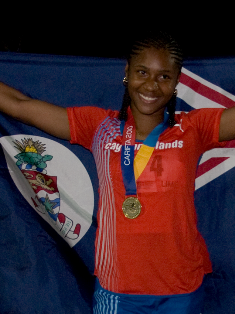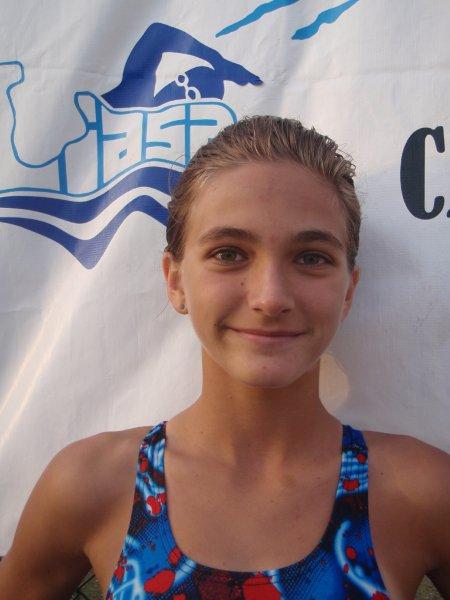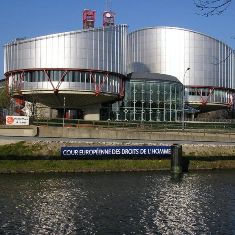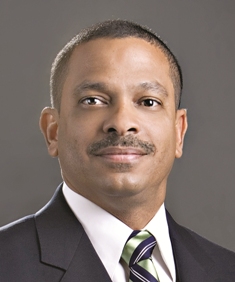Archive for April, 2010

Gold for Cayman in sprint
 (CNS): Chantelle Morrison was wearing Cayman’s first medal of the CARIFTA games last night (Saturday 3 April) after winning gold in the 100 meter women’s under 17 race. Meanwhile in Jamaica in the CARIFTA Swimming Championships, Coral Tomascik took gold in the girls 11-12 breast stroke. Morrison was a hot favourite as she lined up for the final at 8pm last night alongside the region’s best young athletes, having qualified with the fastest time in the semi-finals. She achieved her gold medal in a time of 11:74 seconds. Her win ended a terrific first day of competition, which saw several CARIFTA records broken, including James Kirani of Grenada, who knocked 0.4 seconds off his own games record in the 400 metre final. (Photo by Dennie Warren Jr)
(CNS): Chantelle Morrison was wearing Cayman’s first medal of the CARIFTA games last night (Saturday 3 April) after winning gold in the 100 meter women’s under 17 race. Meanwhile in Jamaica in the CARIFTA Swimming Championships, Coral Tomascik took gold in the girls 11-12 breast stroke. Morrison was a hot favourite as she lined up for the final at 8pm last night alongside the region’s best young athletes, having qualified with the fastest time in the semi-finals. She achieved her gold medal in a time of 11:74 seconds. Her win ended a terrific first day of competition, which saw several CARIFTA records broken, including James Kirani of Grenada, who knocked 0.4 seconds off his own games record in the 400 metre final. (Photo by Dennie Warren Jr)
 Meanwhile in Jamaica, Cayman’s young swimmers were also clocking up the medals in the CARIFTA Swimming Championships. Coral Tomascik (left) took gold in the girls 11-12 breast stroke. Tori Flowers (Girls 13-14 800 Metre Freestyle), Geoffrey Butler (Boys 13-14 1500 Metre Freestyle), Seiji Groome (Boys 15-17 200 Metre Breaststroke) all won bronze medals.
Meanwhile in Jamaica, Cayman’s young swimmers were also clocking up the medals in the CARIFTA Swimming Championships. Coral Tomascik (left) took gold in the girls 11-12 breast stroke. Tori Flowers (Girls 13-14 800 Metre Freestyle), Geoffrey Butler (Boys 13-14 1500 Metre Freestyle), Seiji Groome (Boys 15-17 200 Metre Breaststroke) all won bronze medals.
Small tremor in Cayman
(CNS): The United States Geological Survey (USGS) has confirmed that another earthquake hit the Cayman Islands this evening (Saturday 3 April). A 4.2 magnitude earthquake occurred around 65 miles south of George Town, Grand Cayman, just after 7 pm today (3 April). At just over 6 miles (10KM) deep, the epicentre of the quake was located at 18.36N 81.376W, which is 64 miles south of Bodden Town and 70 miles south of West Bay. There are no reports of damage (just a few shaky tents) and with such a minor quake there are no threats of a tsunami either.
This is the third time Cayman has experience a smaller earth tremor since the more significant 5.9 quake that rocked Grand Cayman on 19 January.
Meanwhile, according to the USGS statistics, there were 22 other earthquakes today around the world, the strongest being a 5.3 in the Kermadic Islands region in the Southern Pacific ocean. Five of those earthquakes occurred in Alaska alone and four in Baja California, in Mexico.

Alternative lending
Recently, the International Monetary Fund (IMF) stated that governments should get tough with banks. The irony of this was not lost on me. The situation in the world is that money is often loaned to countries by the IMF and organizations such as USAID. However, these loans come with many strings attached which cancel out any benefits for ordinary people.
They are often for huge infrasctructure projects, and those projects are undertaken by multi-national corporations which reap the majority of the benefits. The rest is often lost to government corruption, leaving most people exactly where they started.
There is an alternative to this backward practice of giving with one hand and taking away with the other. An organization was begun in San Francisco called KIVA and I would like to tell you something about it.
Many people have heard of micro-financing and micro-banking. Micro-banking involves creating a community bank. Micro-financing involves a process that is similar: People make personal loans to individuals. By going to this website, you can choose someone anywhere in the world you wish to make a personal loan to. The payback record on the loans is 89%. (Far better than Wall Street, is it not, and the "loans" they received from you and me?) There is, of course, a small administration fee involving the people working for KIVA throughout the world. How does $3.25 US sound?
The loans are small, accumulated from several individuals. Often people are not able to access standard banks. They haven’t any collateral other than the work they are willing to put in to better their lives. Therefore, banks aren’t interested. But if they could seize a life they would.
For myself, I have made a loan to woman in Nicaragua, who needs to repair her house. And another to someone in El Salvador who has a small restaurant. The loans are being re-paid.
What you receive is a statement on repayment and the progress of the person you are helping. There is no interest on these loans, which are sometimes as small as US$25 or $50 and you are free to contact the person. There is also the option on being repaid of rolling it over to someone somewhere else.
I believe firmly this is how we make the change we want to see in the world.
Upon visiting the website you can read their stories and see who the person is you would like to help. These are people just like you and me, albeit with fewer advantages. Not a Rolex or a mega-yacht in sight. Just … people trying to better their lives with a little help.
If you are actually, like I was, really tired, infinitely tired, of hearing the same BS from the same people, please take the time to check it out. You can even form a group if you’d like of friends or co-workers. Form your own conglomerate! Within your online portfolio of loans, you will be kept updated on repayments and progress. As I said, the repayments are running at 89%. These aren’t people like AIG looking for a hand-out. All they want is some help — and they’re willing to pay it back.
Wendy recently wrote a viewpoint about Individualism over collectivism. I strongly concour that, by acting individually, collectively we can change the situation many people in the world are living in.
The IMF and banks impoverish people. Loans are made which can never be repaid by their governments, and in the process people lose their resources, property, employment and self-determination. They become serfs without any degree of hope for improving their lives. With micro-financing we are able to cut-out the middlemen. And when we become the bank … we are then the bankers. But with a difference. With compassion. This is what Jesus would have done, no? By making personal loans we have helped in our way to cut-out the greed and avarice. And sleep knowing we’ve actually helped an individual escape poverty. We really have.
Don’t take my word for it. Investigate micro-financing. It is worldwide and growing. By helping someone else win, we win too. Go to the KIVA website and read their policy and the success stories — small loans that have changed peoples’ lives. You will then begin to realize something: we no longer have to depend on banks or the IMF and the costs they extract at the expense of so many decent people.
We’ve re-invented banking.

UK sets up Chagos Islands marine reserve
 (BBC): The UK government has created the world’s largest marine reserve around the Chagos Islands. The reserve would cover a 545,000-sq-km area around the Indian Ocean archipelago, regarded as one of the world’s richest marine ecosystems. This will include an area where commercial fishing will be banned. But islanders, who were evicted to make way for the US air base on the island of Diego Garcia, say a reserve would effectively bar them from returning. UK Foreign Secretary David Miliband said establishing the reserve would "double the global coverage of the world’s oceans under protection".
(BBC): The UK government has created the world’s largest marine reserve around the Chagos Islands. The reserve would cover a 545,000-sq-km area around the Indian Ocean archipelago, regarded as one of the world’s richest marine ecosystems. This will include an area where commercial fishing will be banned. But islanders, who were evicted to make way for the US air base on the island of Diego Garcia, say a reserve would effectively bar them from returning. UK Foreign Secretary David Miliband said establishing the reserve would "double the global coverage of the world’s oceans under protection".
Mary Street shooter charged
(CNS): Continuing the run of success in apprehending suspects connected to the recent surge in gun crime, police have charged a 32-year-old Caymanian man with attempted murder and possession of an unlicensed firearm for the daylight shooting of a woman at a bar in Mary Street, George Town, last month. Police said that officers from the RCIPS had charged Royden Robinson from West Bay following a police operation in George Town this afternoon (Friday 2 April), when he was arrested and charged. Robinson is accused of shooting a woman in the face as she sat outside a bar in Barnes Palaza on 5 March.
The woman sustained serious facial injuries during the shooting, which occurred in the middle of the afternoon.

Mac hits out at PPM paper
 (CNS): The Cayman Islands government is currently in a “salvage operation mode", the premier has stated in his latest attack on the opposition. Responding to the PPM’s position paper submitted to the FCO last week, in which the opposition criticised government over the way it has handled the economic recession, Mckeeva Bush said his government’s actions were all designed to take the country out of the grips of wasteful PPM expenditure. He added that since taking office the UDP administration had to start repairing the damage to the two basic pillars of the economy, finance and tourism, left by the PPM, which had neglected these industries.
(CNS): The Cayman Islands government is currently in a “salvage operation mode", the premier has stated in his latest attack on the opposition. Responding to the PPM’s position paper submitted to the FCO last week, in which the opposition criticised government over the way it has handled the economic recession, Mckeeva Bush said his government’s actions were all designed to take the country out of the grips of wasteful PPM expenditure. He added that since taking office the UDP administration had to start repairing the damage to the two basic pillars of the economy, finance and tourism, left by the PPM, which had neglected these industries.
Instead of criticising the government for having to increase fees, which the premier again claimed were working, he said the PPM should have come up with ideas on how the current government could find the money to pay for the capital projects left by their administration.
“What they should have said is what to do regarding finding the money to finish the new schools and the new government administration office building that they started; what to do about the additional $340 million in loans that they left behind; what to do about the significant increase in civil servants that they caused; what to do about getting the financial industry back on track … and what to do about getting the tourism industry back on track,” Bush said in a statement.
The premier’s office released the statement as Bush and other elected officials joined local and invited pastors, as well as members of the public, at a national prayer meeting in front of the court. On several occasions recently the premier has said that he believes these difficult times will pass with the help of God and had called on the nation to come together to pray for that help.
Against that backdrop in his statement, Bush accused the PPM of playing games and politicizing what he said was a most serious national issue when they claimed not to be able to offer credible solution as they did not know the current economic facts. “They cannot expect the public to believe that after four years at the helm they are not in a position to speak based on fact!” he exclaimed.
He said his government had a credible plan to turn things around. “Things are moving in the right direction. It might be slowly, but I will get the country out of this situation,” Bush said, asking the people to be patient as the country wouldnot get out of this mess in a day. “It will take years of hard work but my government is committed to rescuing our beloved Cayman Islands from the perilous state left by the PPM.”
The premier also said he still intended to roll back the fee increases when the economy recovered. In response to the opposition’s criticism of the increased fees, which they said were hurting the economy further, Bush said he had no alternative but to raise additional revenue by increasing various fees rather than by income tax or property tax. “It is obvious from the latest financial information that those measures are starting to work. I have said that when we turn the economy around we will look at reducing fees. We have reiterated this fact many times, including the day we put the fees in place,” he added.
Blaming the opposition for the country’s current ills, Bush said he needed time to develop plans and to bring business to Cayman, which the PPM failed to do. “The PPM know the mess that they made and that’s why the people voted them out,” he added.

Lifer loses ECHR appeal
 (CNS): A man who is serving a life sentence in HM Prison Northward for the murder of a taxi driver in 2000 has lost his appeal in the European Court of Human Rights (ECHR). Kurt Ebanks was the first person to pursue a human rights case through the ECHR but the seven judges found that Ebanks had not been denied his right to a fair trial as his appeal claimed. Ebanks had claimed that in 2001 when he was convicted in the Cayman Islands Grand Court that certain procedural irregularities had occurred at his murder trial.
(CNS): A man who is serving a life sentence in HM Prison Northward for the murder of a taxi driver in 2000 has lost his appeal in the European Court of Human Rights (ECHR). Kurt Ebanks was the first person to pursue a human rights case through the ECHR but the seven judges found that Ebanks had not been denied his right to a fair trial as his appeal claimed. Ebanks had claimed that in 2001 when he was convicted in the Cayman Islands Grand Court that certain procedural irregularities had occurred at his murder trial.
Ebanks first took his claim to the Cayman Island Court of Appeal and then the Judicial Committee of the Privy Council in London. The conviction was upheld in the Privy Council in August 2006 by a majority of 3 judges to 2; Lord Johan Steyn had dissented and stated that the Court of Appeal had failed to accord Ebanks “due process” and that there had also been “a material irregularity”.
Ebanks then took his case to Strasburg and the ECHR, Cayman’s highest appeals tribunal in matters of human rights, complaining that his lawyers in the Grand Court trial had failed to properly defend him and act according to his instructions, and then the Cayman Islands Court of Appeal and the Privy Council had both failed to remedy that injustice.
According to details in the Privy Council ruling, Ebanks had claimed during his trial that his lawyers denied him the opportunity to give evidence and failed to cross examine police officers who presented a statement that Ebanks denies making, therefore undermining his right to a fair trial.
Ebanks’ petition against the UK Government was filed by attorney Robin McMillan of the law firm Appleby, while David Perry QC represented the UK Government.
Speaking about the significance of the case, Attorney General Samuel Bulgin QC said that, as far as he was aware, this was the first time the right to appeal to the ECHR had been used by an appellant from the Cayman Islands.
The seven judges found that while Ebanks’ case was admissible to be heard, neither of these rights had been violated and he had received a fair trial.
Ebanks, who was tried and convicted for the murder of Curtis Seymour, was represented by Appleby’s on a pro bono basis. The lawyers said last year that the progress of this petition to the ECHR provided objective confirmation that in relation to human rights the Cayman Islands Courts system was now subject to scrutiny and review at the highest international judicial level.
“Moreover, an institutional mechanism was clearly seen to exist which enabled an even higher judicial body to reverse decisions of the Privy Council in relation to Cayman Islands Law. In other words, those decisions were no longer necessarily the final decisions,” added McMillan, who brought the original submission.
Although Cayman now has a Bill of Rights enshrined in its constitution, enabling people to bring human rights cases before our own Grand Court, it does not come into effect until November 2010. In the interim, the people of the Cayman Island still have the individual right to petition the Strasbourg court whenever the Cayman government or authorities have denied their human rights.
HRC seeks to clarify interim position
(CNS): Although the Bill of Rights enshrined in the Cayman Islands Constitution 2009 will not come into effect until November 2012, the Human Rights Commission has already been created under another part of the Constitution, which was enshrined last year. As a result, HRC chair Richard Coles says that the commission has sought advice about its powers during this interim period. Speaking to CNS this week, Coles said the commission wanted to clarify the unusual position it found itself, in that it had been “given life by the Constitution” but the Bill of Rights is not yet part of the law.
The chair said the HRC has contacted Professor Jeffery Jowell, who assisted in the development of the Constitution, in the hope that he would be able to better clarify how the commission could begin protecting rights before the bill is enforced.
Recognising that there was considerable work ahead for the HRC, Coles, a former attorney general, told CNS that he was relishing the opportunity to be involved with the development of the commission as it was not often that one was given the chance to be at the very start of something so important.
With the HRC already established and until the situation was clarified, Coles said members could focus on examining existing laws and noting any problems with them, raising awareness and starting on the education campaign. Despite the fact that its powers were not yet clear, the HRC at the very least could draw attention to potential or current human rights abuses that will need to be addressed before the Bill of Rights is in place.
Acknowledging there were a number of topical issues related to human rights questions, Coles added that there were a number of things the commission would be keeping a close eye on. Asked about the changes to the legal aid system, Cole said the HRC would not be concerned with the way the funding was managed or administered but that all those facing the courts were adequately represented.
“The concern of the HRC is that every accused person has a fair trial and is represented by competent attorneys throughout,” Coles said, adding that if the present review was causing uncertainty and problems with representation, the commission would make that known. “We expressed concerns to the committee which reviewed the legal aid about the need for representation for all; how it is administered is not our concern, so long as it accomplishes the goal of fair representation.”
When asked about the case of a man who was acquitted of murder in October of last year but who has since been re-arrested and is currently facing the possibility of being tried again for the same crime, Coles noted it was inappropriate to talk about specific cases but said the HRC may want to review the Court of Appeal Law. He said that the question of double jeopardy was a human rights issue but the law in this regard, on the surface of it, did not appearto run contrary to the Bill of Rights.
Section 7 (4) indicates that a person cannot be tried again for an offence from which they have been acquitted, “… save on the order of a superior court…”
Coles said that aside from examining the country’s laws for compatibility with the Bill of Rights, the commission could also use the interim period to promote awareness of human rights and he acknowledged there was considerable work to do. Coles said there was “genuine fear and apprehension” that the Bill of Rights might affect the way of life in the Cayman Islands.
“This is really fear of the unknown. and although human rights are not new to Cayman. it is the first time they have been enforceable through the courts,” Coles said, adding that in the past people had been able to take cases to the European Court but it was a complex and time consuming process. The first and only case from the Cayman Islands was recently ruled on by the ECHR, which found that a convicted murderer had not been denied his right to a fair trial.
The HRC intended, Coles explained, to embark on a major education campaign, which included visiting schools and exploring many other ways that would offer the opportunity to educate the community about the benefits of the Bill of Rights and not see it as a threat.
Coles also noted that the HRC would be striving to be as transparent as possible, and while it would not be appropriate to hold meetings in public because of the confidentiality of the cases likely to come before it, the commission had agreed they would be publishing the minutes of the meetings on the Commission’s website, which was currently being created.
The chair explained that confidential information could then be redacted before the minutes were posted, protecting privacy when necessary but also allowing full transparency of the HRC’s work. The website would become an important tool in the goal of both transparency and education for the HRC, he added.
As the body that will seek to educate, promote and uphold the rights enshrined in the Constitution, Coles said it was not the only body that could campaign for specific rights. He said there was room in the community for social and grass roots activist groups that could promote and campaign for specific rights under the Constitution as well as the need to enhance them where necessary.
“We will promote human rights but there is scope for other bodies to lobby for particular rights and some sections of Cayman society may be better placed than the commission to campaign on specific rights issues, which could then be brought to the HRC,” Coles added.
The Bill of Rights which is now enshrined in the Constitution will come into effect in November 2012, three years after the 2009 Constitution was adopted. Between now and then, all of the laws in the Cayman Islands willneed to made compatible and a number of issues will also need to be addressed by government, from how young offenders are imprisoned and the enactment of some from of environmental protection law.

Cayman lacks stats on challenging condition
 (CNS): In a message marking World Autism Awareness Day, the minister of health admitted that there are no statistics in the Cayman Islands about how much the condition is impacting families here, but, he said, the HSA is working on a national protocol for screening. A campaign has also begun to raise awareness of the condition with health care staff and those working with pre-schoolers. Mark Scotland said without a cure the only recourse was to build knowledge about autism and offer professional help and personal support to those families who are coping with it.
(CNS): In a message marking World Autism Awareness Day, the minister of health admitted that there are no statistics in the Cayman Islands about how much the condition is impacting families here, but, he said, the HSA is working on a national protocol for screening. A campaign has also begun to raise awareness of the condition with health care staff and those working with pre-schoolers. Mark Scotland said without a cure the only recourse was to build knowledge about autism and offer professional help and personal support to those families who are coping with it.
“Today is World Autism Awareness Day, designated by the United Nations to highlight autism as a growing epidemic, to promote early diagnosis and intervention, and to build support for those with this complex neurological disorder. A campaign has also begun to raise awareness of the condition with health care professionals and those working with pre-schoolers.
“In the United Kingdom, the National Autistic Society estimates that more than half a million people have some form of autism.